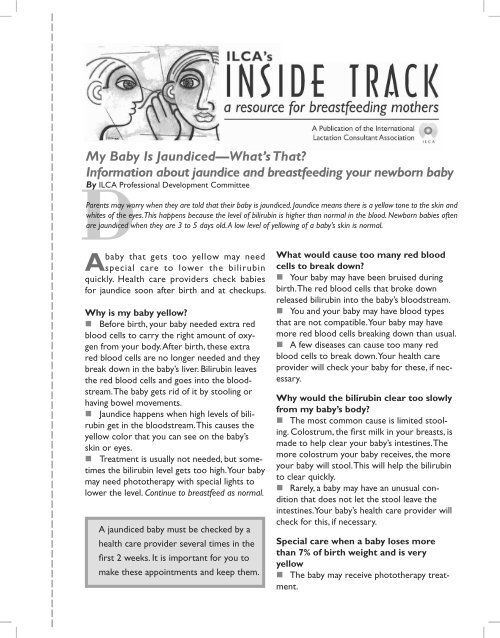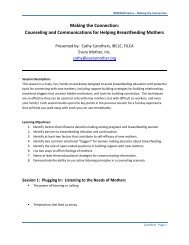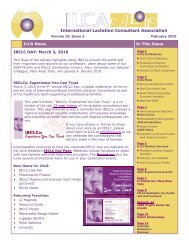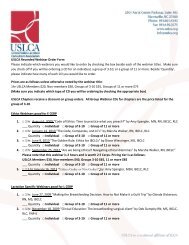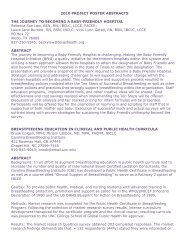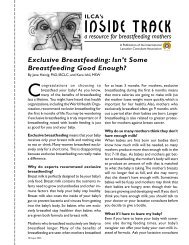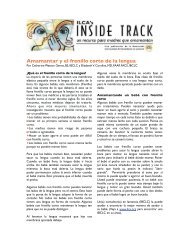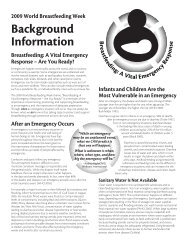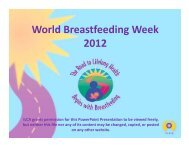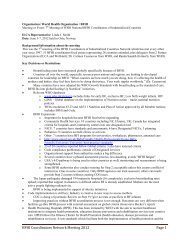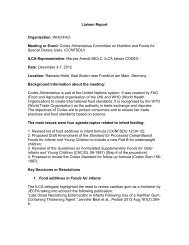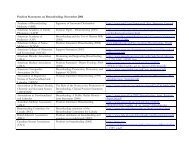My Baby Is JaundicedâWhat's That? - International Lactation ...
My Baby Is JaundicedâWhat's That? - International Lactation ...
My Baby Is JaundicedâWhat's That? - International Lactation ...
You also want an ePaper? Increase the reach of your titles
YUMPU automatically turns print PDFs into web optimized ePapers that Google loves.
<strong>My</strong> <strong>Baby</strong> <strong>Is</strong> Jaundiced—What’s <strong>That</strong>?<br />
Information about jaundice and breastfeeding your newborn baby<br />
DBy ILCA Professional Development Committee<br />
Parents may worry when they are told that their baby is jaundiced. Jaundice means there is a yellow tone to the skin and<br />
whites of the eyes. This happens because the level of bilirubin is higher than normal in the blood. Newborn babies often<br />
are jaundiced when they are 3 to 5 days old. A low level of yellowing of a baby’s skin is normal.<br />
baby that gets too yellow may need<br />
A special care to lower the bilirubin<br />
quickly. Health care providers check babies<br />
for jaundice soon after birth and at checkups.<br />
Why is my baby yellow?<br />
Before birth, your baby needed extra red<br />
blood cells to carry the right amount of oxygen<br />
from your body. After birth, these extra<br />
red blood cells are no longer needed and they<br />
break down in the baby’s liver. Bilirubin leaves<br />
the red blood cells and goes into the bloodstream.<br />
The baby gets rid of it by stooling or<br />
having bowel movements.<br />
Jaundice happens when high levels of bilirubin<br />
get in the bloodstream. This causes the<br />
yellow color that you can see on the baby’s<br />
skin or eyes.<br />
Treatment is usually not needed, but sometimes<br />
the bilirubin level gets too high. Your baby<br />
may need phototherapy with special lights to<br />
lower the level. Continue to breastfeed as normal.<br />
A jaundiced baby must be checked by a<br />
health care provider several times in the<br />
first 2 weeks. It is important for you to<br />
make these appointments and keep them.<br />
What would cause too many red blood<br />
cells to break down?<br />
Your baby may have been bruised during<br />
birth. The red blood cells that broke down<br />
released bilirubin into the baby’s bloodstream.<br />
You and your baby may have blood types<br />
that are not compatible. Your baby may have<br />
more red blood cells breaking down than usual.<br />
A few diseases can cause too many red<br />
blood cells to break down. Your health care<br />
provider will check your baby for these, if necessary.<br />
Why would the bilirubin clear too slowly<br />
from my baby’s body?<br />
The most common cause is limited stooling.<br />
Colostrum, the first milk in your breasts, is<br />
made to help clear your baby’s intestines. The<br />
more colostrum your baby receives, the more<br />
your baby will stool. This will help the bilirubin<br />
to clear quickly.<br />
Rarely, a baby may have an unusual condition<br />
that does not let the stool leave the<br />
intestines. Your baby’s health care provider will<br />
check for this, if necessary.<br />
Special care when a baby loses more<br />
than 7% of birth weight and is very<br />
yellow<br />
The baby may receive phototherapy treatment.
Additional fluids may be needed—breast<br />
milk (preferred), artificial baby milk (formula),<br />
or intravenous fluids.<br />
The baby’s health care provider will explain<br />
how you can stay with your baby if<br />
hospital care is needed.<br />
Once the baby’s bilirubin level is lower,<br />
treatment will discontinue. You can return<br />
to simply breastfeeding your baby.<br />
You can help lower your baby’s jaundice<br />
level<br />
Hold your baby skin-to-skin soon after<br />
birth and often in the early days.<br />
Breastfeed soon after birth and often<br />
in the early days. This will increase your<br />
baby’s intake of breast milk, which will<br />
increase bowel movements.<br />
Learn how to remove more milk from<br />
your breasts and how to give it to your<br />
baby.<br />
Express colostrum and give by cup or<br />
spoon if your baby is sleepy.<br />
Ask a lactation consultant to observe<br />
your baby feeding to check that your baby<br />
is breastfeeding effectively.<br />
Learn how to tell when your baby is hungry<br />
and breastfeed as soon as your baby shows<br />
hunger signs.<br />
Expect your baby to breastfeed 8 to 12 times<br />
or more in 24 hours during the first week.<br />
Wake your baby to breastfeed if your baby<br />
does not show hunger signs at least every 3<br />
to 4 hours.<br />
Learn how to stimulate your baby to<br />
stay awake during feedings and to suck<br />
effectively.<br />
It is important to continue breastfeeding.<br />
Giving water does not clear out the bilirubin.<br />
Call your baby’s health care provider if:<br />
<br />
Your newborn baby is not nursing 8<br />
to 12 times or more in 24 hours.<br />
<br />
<br />
<br />
<br />
<br />
<br />
<br />
Your baby is not having the expected<br />
number of wet or soiled diapers:<br />
Day 2<br />
At least 2 wet diapers<br />
At least 3 black tarry stools<br />
Day 3<br />
At least 3 wet diapers<br />
At least 3 greenish brown stools<br />
Day 4<br />
At least 6 wet diapers<br />
At least 3 mustard yellow stools<br />
Your baby is either always sleeping or<br />
always fretful.<br />
Your baby’s eye or skin color seems<br />
to be getting more yellow or orange,<br />
or the color is below the level of the<br />
belly button.<br />
FIND HELP FAST<br />
Go to “Find a <strong>Lactation</strong> Consultant”<br />
at www.ilca.org to locate a certified<br />
lactation consultant (IBCLC) in your area.<br />
You can also ask a health care provider at<br />
your hospital or contact your communitybased<br />
health care program.<br />
Your Local <strong>Lactation</strong> Consultant


